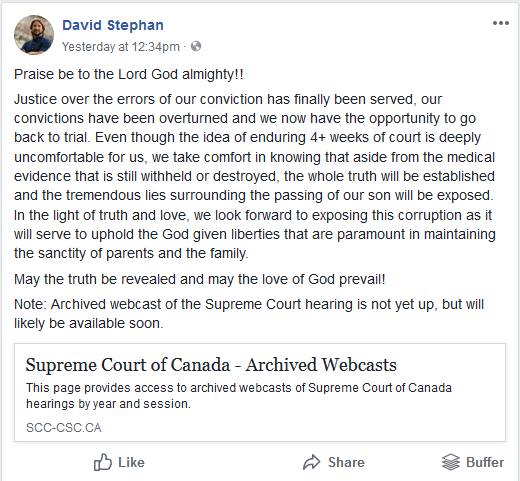
Ezekiel Stephans’ parents, who attempted to treat his vaccine-preventable meningitis with hot sauce, horseradish, and naturopathic remedies.
In 2016, David and Collet Stephan were found guilty of failing to provide the necessaries of life for their 19-month-old son, Ezekiel, who died of bacterial meningitis. The Stephans had ignored obvious signs that the son was seriously ill, and instead used vitamins, supplements, hot pepper, horseradish, and remedies from the family’s own home business, Truehope Nutritional Support. Ezekiel had never seen a physician in his life. He had received no vaccinations, including vaccination against Haemophilus influenza type b (Hib), a vaccine which protects against bacterial meningitis. And as he lay dying, the parents chose to use an Echinacea tincture recommended by a naturopath, who never examined the boy. His body was so stiff, he couldn’t sit in his car seat, and had to lie in a mattress in their car. The Stephans eventually called 911, but the toddler still died, and the cause of death was subsequently identified as bacterial meningitis.
David Stephan was sentenced to four months in jail. Collet Stephan was ordered to spend three months under house arrest. The Stephans appealed, but the conviction was upheld by the Alberta Court of Appeal in November 2017. However, because the ruling was not unanimous, there was an automatic right of appeal to the Supreme Court of Canada. The Stephans exercised that right.
Monday, the Supreme Court of Canada ordered a new trial. Are the Stephans vindicated? No, not even close.
Ezekiel’s last days
The Canadian Press has a concise summary of Ezekiel’s tragically short life:
August 20, 2010: Ezekiel Stephan is born at home with the assistance of birthing assistant Terry Meynders, who is also a registered nurse.
February 27, 2012: Ezekiel takes ill at the family home in Glenwood, Alta. His mother describes him as having a cold, stuffy nose and trouble breathing. “The sound he was making was heartwrenching. This isn’t the kind of sound you want to hear from your child,” she testifies later at the trial.
February 28-March 5, 2012: Ezekiel is treated for what his parents believed to be croup, an upper airway infection that leads to a barking cough. In addition to regular smoothies, they give the boy olive leaf extract, garlic, hot peppers and horseradish. They also attempt to help his breathing with cool air and a humidifier.
March 5, 2012: Ezekiel seems to improve. His father says the boy is not 100 per cent, but he no longer has any difficulty breathing and is able to go to preschool. He plays with his toys and manages to eat some solid food.
March 6, 2012: Ezekiel suffers a setback. He is “unusually lethargic,” lies in bed the entire day and his only response is to moan unhappily. He doesn’t eat or drink and is exhibiting unusual neurological symptoms.
March 7, 2012: Ezekiel seems to improve again. His abnormal movements stop and he can watch TV, but still isn’t playing normally.
March 8-10, 2012: Ezekiel’s parents note he seems to be gradually improving. He regains a bit of his appetite, but is not active or playful.
March 11, 2012: Ezekiel’s symptoms worsen again. He refuses to eat or drink and is lethargic. His parents notice his body is very stiff.
March 12, 2012: Ezekiel’s body is so stiff that his back is arched. He is getting fluids through an eyedropper because he will not drink on his own. Meynders comes to the home and checks his vitals. She suggests he could possibly have viral meningitis and says she tells the mother she should take the boy to a doctor. “It did not jump out at me that he was that seriously ill,” Meynders testifies.
March 13, 2012: The Stephans head to Lethbridge to pick up an echinacea mixture from a naturopath. Ezekiel is too stiff to sit in his car seat and has to lie on a mattress in the vehicle. Back at home that evening, the boy stops breathing on a couple of occasions before his parents leave home to meet an ambulance. The breathing equipment in the ambulance it too large to properly help a small child. The boy is taken to hospital in Cardston and then to Lethbridge for transport to Calgary by air.
March 14, 2012: Ezekiel arrives at Alberta Children’s Hospital in Calgary where doctors tell the parents the boy is showing very little brain activity and the prognosis is bleak. He is put on life support.
March 16, 2012: Ezekiel dies.
The facts seem clear in this case. Ezekiel was seriously ill with bacterial meningitis, a vaccine-preventable disease. Had he been seen by medical professionals promptly, he might be alive today. His parents endangered his life by ignoring clear signs that he was seriously ill. A registered nurse recommended a physician assessment. The parents ignored this advice.
The Supreme Court of Canada’s decision
The appeal was heard Monday, May 14. The court made the following assessment:
The Supreme Court heard arguments from the couple’s lawyer and the Crown before making the unusual move of ruling immediately from the bench.
Justice Michael Moldaver, speaking for the high court, said the trial judge did not properly instruct jurors on what would be a marked departure from reasonable behaviour “in a way that the jury could understand.”
“Accordingly we would allow the appeal, quash the convictions and order a new trial.”
Karen Molle, lawyer for the Stephans, had argued the trial judge didn’t instruct the jury properly to determine whether the Stephans acted differently than other reasonable parents.
“This jury charge gave this jury little choice but to convict,” Molle said.
Julie Morgan, representing the Crown, said the trial judge’s language was generalized but it was enough for the jury to understand the case.
“The jury would have understood what their job was,” she told the court. “They found that the appellants did not meet the community standard, when they failed to take their child to a doctor when he had meningitis, and that endangered his life.”
And from the CBC:
The Stephans’ defence lawyer, Karen Molle, told the Supreme Court judges that due to the significant “polarization of evidence” and “overabundance of medical evidence,” the charge from Alberta Court of Queen’s Bench Justice Rodney Jerke did not supply jurors with the tools they needed to properly decide the case. In the decision, Supreme Court Justice Michael Moldaver said the panel agreed that the trial judge conflated two elements of the offence to be decided by the jury and failed to sufficiently explain the concept of marked departure in a way the jury could apply and understand it.
And:
The two elements the judges believe were combined by the trial judge are actus reus and mens rea. Actus reus, Latin for guilty act, raises the question of whether the Stephans failed to provide their son with the medical attention that was necessary in the circumstances. Mens rea, Latin for guilty mind, raises the question of what level of risk could objectively be foreseen by a reasonable person. The concept of marked departure was explained by Crown Julie Morgan as actions removed from what a reasonable person would do in a specific situation, in this case meaning not taking a child displaying symptoms of meningitis to the hospital.
Now I’m a pharmacist, not a lawyer, so I will defer to experts for their assessment of the court’s ruling. What it effectively means today is that the Stephans now face another trial:
A spokeswoman for Alberta Justice said the file will return to Lethbridge Court of Queen’s Bench to set a new trial date.
“The Crown has an obligation to continually assess the evidence/file against the prosecution standards of a ‘reasonable likelihood of conviction’ and if it is ‘in the public interest to proceed’ with a case,” said spokeswoman Katherine Thompson.
Although David Stephan said the prospect of a new trial is “deeply uncomfortable for us,” he rejoiced in the Supreme Court’s decision.
“Praise be to the Lord God Almighty!!” Stephan wrote on Facebook.

What is this whole truth that David Stephan says is being withheld or destroyed? Just after the trial, he elaborated a bit – in a clip he described on his Facebook page as “Mainstream Media’s agenda begins to shine through”:
No surprise, David Stephan is as unrepentant as ever. Right from the beginning of the criminal charges, there have been claims of “conspiracy” that have continued through this week. To David Stephan, it’s all about “freedom” versus “Big Pharma” and their agenda…which appears to be, if they do have an agenda, it’s preventing children from dying from meningitis by selling a vaccine that prevents meningitis.
No choice for children harmed by pseudoscience
This is a horrible tragedy, and we haven’t seen the end of the story. Astonishingly, as a glance at the Stephans’ Facebook page shows, there is no shortage of supporters for the Stephans’ actions. Yet no matter how far the Stephans will continue to spin this, they are not victims. Ezekiel, who was denied proper medical care through the Stephans’ neglect, is the only victim. He had no voice, and no choice. If society has a duty to protect children, is it doing enough to prevent cases like these? We will see what the courts have to say.

